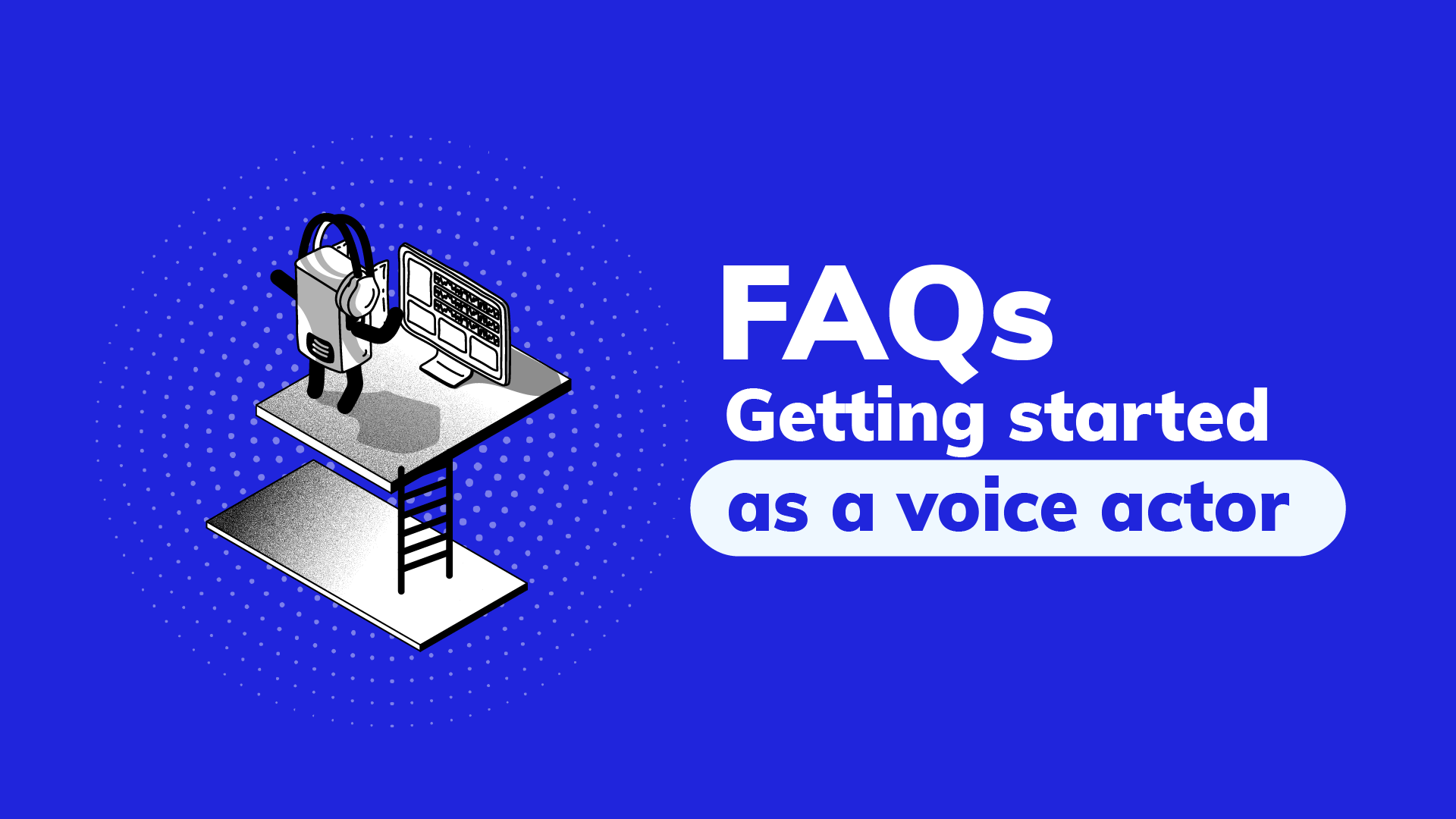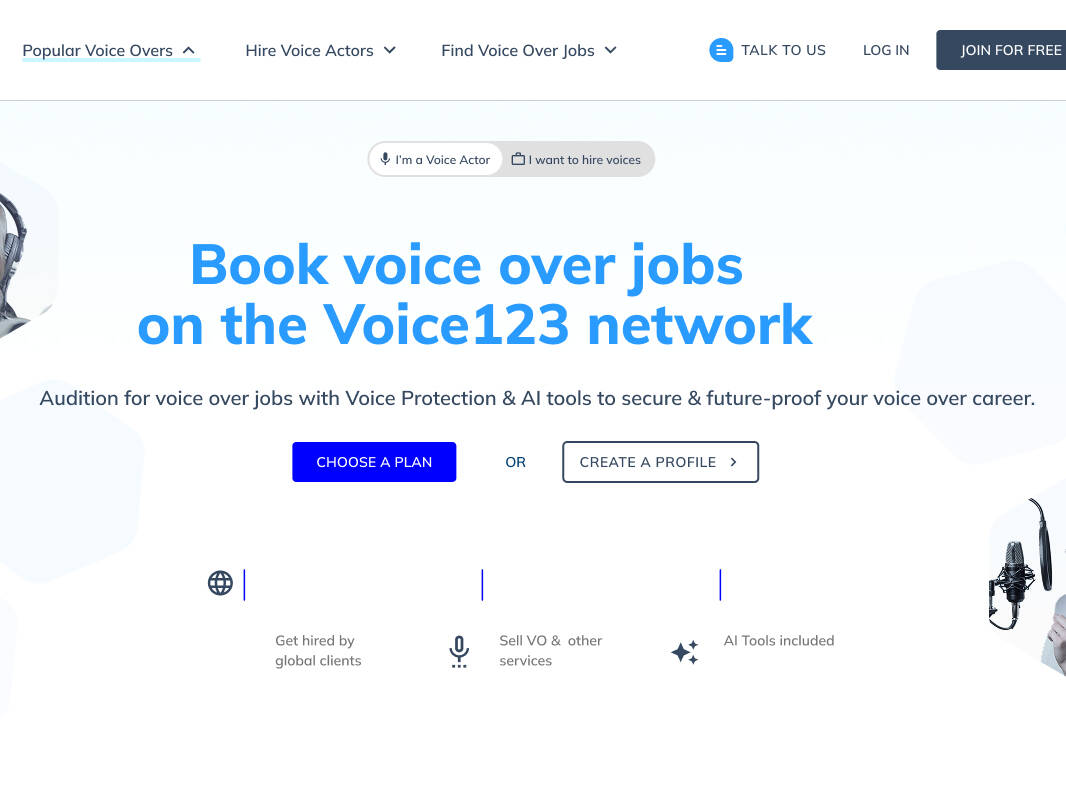
FAQs: Getting started as a voice actor
How do I start a career in the voice over industry?
Starting a career in the voice over industry requires training. So, we recommend voice coaching and audio tech training because you need fundamental skills in both fields to succeed.
If you would like to read a guide written for voice actors by voice actors, please take a look at The Voice Over Guide. We’d also recommend signing up for our Free membership, so you can get a feel for both the voice-over industry and Voice123.
Once you have your samples (professionally produced to industry standards), you can upgrade your membership. You can learn more about the different memberships we offer by visiting our memberships page.
We wish you every success with your voice-over career, and if you have any questions about Voice123, contact our Customer Success team at help@voice123.com.
What equipment do I need to get started?
Before you get started with the equipment, you’ll need a functional home studio with a treated voice booth (or walk-in closet!) to submit proposals. Since most clients will expect you to record professional, high-quality audio.
If you are building a recording space, make sure you treat it well to prevent room echoes and reflections from ruining your audio. Once your studio is set up, you’ll need voice over equipment like:
- A computer
- A microphone with a USB connection or a recording interface that has one.
- A pop filter to prevent blasts of breath caused by plosive consonants such as p’s and b’s.
- Recording and editing software.
An excellent resource to consult is the ‘Setting up a home recording studio‘ section from the Voice over Guide on The Booth, especially our piece on Equipment for voice overs.
In some cases, local voice actors are requested to record in the client’s studio, but this rarely happens in today’s world of online voice casting. Clients will consider the audio quality and your voice when listening to your proposals, so give yourself every advantage by submitting proposals with high-quality audio.
Which internet browsers work best when using Voice123?
For the best experience using Voice123, we suggest using the latest versions of Google Chrome, Safari, Mozilla Firefox, or Microsoft Edge. Browser developers frequently make improvements to provide you with a faster, more secure online experience.
Some features of the Voice123 platform don’t work with an outdated or unsupported browser—and we often can’t provide technical support in this case. For the cases where the browser is not supported, we’ll show an informational banner indicating it.
Is it possible to get work as a union member on Voice123?
Yes, we work with union members from British Equity, ACTRA (Canada), SAG-AFTRA (US), and Union Des Artistes (Canada) members, but other union members are welcome as well. Union members can also quote union rates for any project they audition for, and they can even specify on their profile that they only take union work.
What does a scam look like?
A scam usually starts with a message asking for an audition or a demo. The client will then get in touch and tell you that you cannot see the script, but it will be released shortly before the recording session, and they have a local studio where they’d like you to record.
They’ll issue you a check that includes your pay and a portion that you must forward to another individual and send you to their recording studio. The check will turn out to be fake. You’ll cash it and forward the money to the other individual, but within days your bank will contact you to inform you that the check bounced. On contacting the studio, there’ll be no record of a booking for you.
Here are some tips to protect yourself from scams:
Please use caution when dealing with people you don’t know online and contact help@voice123.com to report suspicious projects.
- Trust your instincts and never wire funds.
- That you’re your own business and have to be cautious
- Not to deliver ready-to-use samples without pay; watermark them or change keywords to protect yourself.
- Not to extend payment to anyone you have not met in person.
- To negotiate payments through safer means such as PayPal
- If someone makes a booking for you at a studio, please contact the studio to confirm.
What is FTP, ISDN, Phone Patch, Source Connect, or ipDTL?
Under Recording & Delivery Capabilities on your profile, you will find numerous options for recording and delivering your performances to a client. FTP is an acronym for File Transfer Protocol that’s used to transfer files between computers on a network.
Two popular FTP services you can use for sharing files are:
- Dropbox: A file hosting service where you can store and share files.
- Google Drive: A file storage and synchronization service created by Google. It allows users to store files in the cloud, share files, and edit documents, spreadsheets, and presentations with collaborators. The Google Drive option is free to use when you have a Gmail account.
ISDN, Phone Patch, Source Connect, and ipDTL are all technologies that allow the client to listen in and direct performances in real-time.
ISDN and Phone Patch are the original hardware-based technologies that run over traditional telephone lines, with ISDN being the industry standard. The hardware is relatively expensive but is still very common in the industry.
Source Connect and ipDTL are computer-based technologies that connect over the internet. Both can be subscription-based, and ipDTL is even browser-based for added simplicity.
Ready to upgrade your membership?
Share this post!
A blog owner yourself? Relevant links to quality sites will help your performance on search engines. If your readers will benefit from the services or information on The Booth's Voice over Guide, please consider linking to this post or the guide itself.


